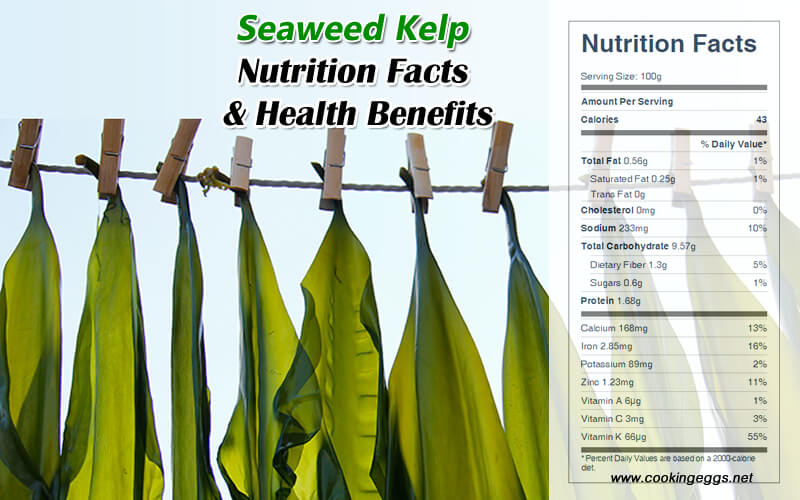Seaweed Kelp Nutrition Facts & Health Benefits
Kelp is the most common type of seaweed. Kelp is a sea vegetable that is eaten in many parts of the world. Because of the mineral-rich environment of the sea, kelp provides the broadest range of minerals of any food.
The nutritional value of kelp
The kelp is 82% water, 9.6% carbohydrates, 1.7% protein, and contains negligible fat. They are especially rich in minerals, including calcium, iodine, iron, magnesium, and trace minerals. They also contain vitamin A, folate, and vitamin K.
Three and one-half ounces of raw kelp provides 43 calories, 9.6 g carbohydrate, 1.7 g protein, 0.6 g fat, 1.3 g dietary fiber, 116 IU vitamin A, 3 mg vitamin C, 180 mcg folic acid, 89 mg potassium, 42 mg phosphorus, 233 mg sodium, 168 mg calcium, 2.85 mg iron, 121 mg magnesium, and 1.23 mg zinc.

Raw Kelp Nutrition Facts Label
Health Benefits of Kelp
Kelp can be used to soften beans during cooking and to help convert indigestible sugars and thus reduce flatulence.
Because of its high concentration of iodine, brown kelp has been used to treat goiter, an enlargement of the thyroid gland caused by a lack of iodine, since medieval times. Sea vegetables are an excellent source of iodine, necessary for healthy thyroid function and the prevention of goiter. If you have stopped using ordinary iodized table salt, you may wish to add sea vegetables to your meals to provide this essential mineral. You can even keep a container of kelp flakes on the dinner table and use it instead of table salt for seasoning foods. An intake of roughly 150 micrograms of iodine per day is beneficial for preventing hypothyroidism.
Kelp's rich iron content can help prevent iron deficiency. Iron is essential for red blood cells, where most of the human body's iron is contained. Controlling iron levels in the body is a critically important part of many aspects of human health and disease.
Kelp is an excellent source of vitamin K. Research suggests that vitamin K can help to support cardiovascular health and reduce the risk of osteoporosis. Vitamin K has been linked with lower bone density and an increased risk of hip fracture in women, and daily supplements of vitamin K significantly reduce this risk.
Alginate is a kelp-derived carbohydrate that is used to thicken products such as ice cream, jelly, salad dressing, and toothpaste. Kelp polysaccharides are used in skin care as gelling ingredients and because of the benefits provided by fucoidan. Fucoidan is currently utilised in a wide range of products currently on the market, such as dietary supplements, skincare products, medical devices, functional food and beverages, and animal health products. Fucoidan is also used in medical and pharmaceutical research.
In 2010, researchers found that alginate, the soluble fibre substance in sea kelp, was better at preventing fat absorption than most over-the-counter slimming treatments in laboratory trials. As a food additive, it may be used to reduce fat absorption and thus obesity. Kelp in its natural form has not yet been demonstrated to have such effects.
Fucoidan from kelp contains 60% and is an excellent food fiber for diabetics. It delays gastric emptying and food through the small intestine, so, even in the case of the reduction in insulin secretion, blood glucose levels are not increased, perhaps helping with diabetes control.
Kelp also provides the B vitamins: folate (45% DV), riboflavin (13% DV), and pantothenic acid (13% DV). Folate is required for the body to make DNA and RNA and metabolise amino acids necessary for cell division. More studies suggest that folic acid may help prevent heart disease, stroke and certain cancers, especially colon cancer.
Tips:
When cooking beans, put kelp in the cooking water. It will expedite the cooking process and improve the beans’ digestibility by reducing the chemicals that can cause flatulence.
Because of their high sodium content, however, be sure to drink a lot of water to balance out the sodium when eating kelp or other sea vegetables.